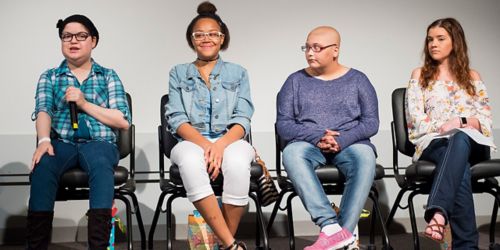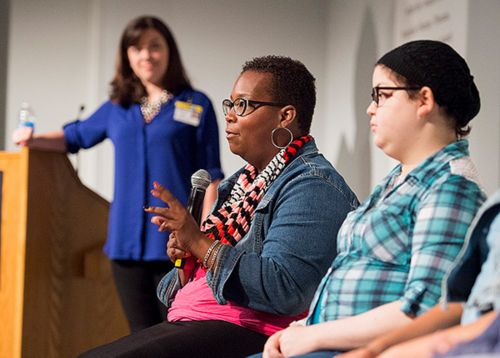St. Jude Family of Websites
Explore our cutting edge research, world-class patient care, career opportunities and more.
St. Jude Children's Research Hospital Home

- Fundraising
St. Jude Family of Websites
Explore our cutting edge research, world-class patient care, career opportunities and more.
St. Jude Children's Research Hospital Home

- Fundraising
The St. Jude Psychology Clinic: When things are really hard

St. Jude Children’s Research Hospital’s patients share their stories during Children’s Mental Health Awareness Week. From left: Karina Perez-Ortiz, Trinity “Kayla” Buie, Olivia Oliver and Hannah Whiteaker.
Each year, the St. Jude Children’s Research Hospital Psychology Department staff spends thousands of hours helping patients deal with anxiety, depression, pain, cognitive changes, medication noncompliance, school re-entry and other issues.
Good mental health is important when patients and families are facing life-threatening diseases. If difficulties arise, a patient’s medical team can make a referral for a consultation with the Psychology Department. Patients and families may also request referrals to the service, which comprises psychologists, neuropsychologists, senior psychological examiners, postdoctoral fellows, interns and graduate students.

St. Jude Children’s Research Hospital’s Niki Jurbergs, PhD, (left) of the Department of Psychology and St. Jude patient Karina Perez-Ortiz listen to St. Jude parent Elnora Blackledge-Lee express gratitude for the help that her daughters received from the Psychology Clinic.
Psychologists in the clinic are happy to meet with any patients or families to answer questions or help with psychological concerns related to their children or their children's treatment.
“Treatment doesn’t necessarily mean that you have a mental health or psychiatric diagnosis,” says Niki Jurbergs, PhD, assistant director of the Psychology Clinic. “It might mean that you just need a little bit of support, a little bit of problem-solving.”
A bit of problem-solving went a long way in helping Elnora Blackledge-Lee find appropriate school accommodations for her three daughters. All of the girls are St. Jude patients undergoing treatment for neurofibromatosis type I, a genetic disorder that can result in a higher risk of cancerous tumors.
Blackledge-Lee spoke to an audience of St. Jude patients, family and staff during the Psychology Department’s patient-parent panel, part of an annual celebration of Children’s Mental Health Awareness Week.
She explained how the correct documentation—the results and recommendations from a neuropsychological assessment report—helped her document the need for special services. She recalled feeling more empowered to be an effective advocate in her interactions with school personnel. That empowerment was a direct result of the neuropsychological testing services she received at St. Jude.
Karina Perez-Ortiz, 19, is a St. Jude patient who was treated for acute myeloid leukemia, an aggressive pediatric cancer. Perez-Ortiz remembers her first appointment in the St. Jude Psychology Clinic.
"Just the thought that I had to go there to talk to someone I didn't know about stuff that I don't even tell my mom … it was kind of hard," she said.
“Stuff you don't even tell your mom” is part and parcel of the work done by St. Jude psychologists. The Psychology Clinic provides a wide range of support, intervention and assessment services to patients and their families.
Psychologists in the clinic use evidence-based interventions to achieve positive results. Such interactions can include a cognitive intervention that may help a patient focus on more rational thoughts. Another session may incorporate a behavioral intervention that may help a patient decrease avoidance and isolation while increasing engagement in activities designed to improve mood.
Perez-Ortiz overcame her reluctance to go to therapy.
“The psychologists are not there to tell you how you need to feel,” said Perez-Ortiz, “but to understand how you feel.”
Perez-Ortiz said she particularly enjoyed attending the St. Jude Teen Formal — an opportunity to wear a nice dress, ride in a limo and attend a big party. Attending a party is not only fun but is a behavioral distraction, a psychological technique that can draw attention away from troubling thoughts. Distraction can be used in conjunction with other techniques to help children navigate their situation.
When the weight of a life-threatening diagnosis pushes in, when a patient needs someone in whom to confide, Perez-Ortiz reminds us that “psychology is there when things are really, really hard.”






